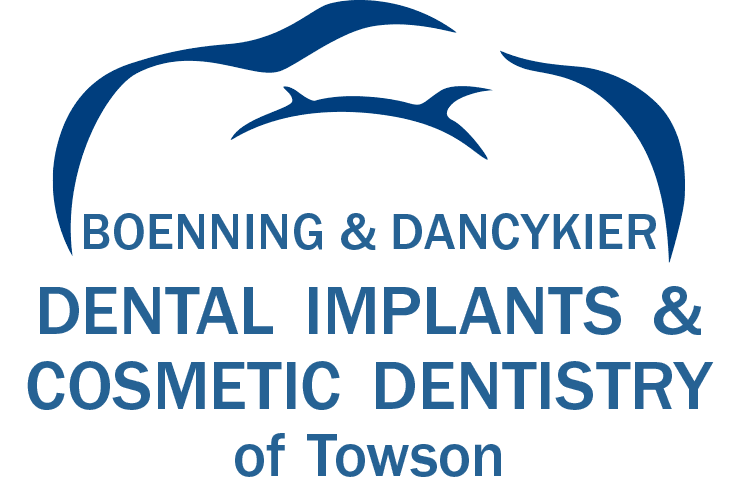Dr. Keith Boenning and Dr. Nate Dancykier are experienced general dentists that provide comprehensive dental services to their patients. To serve a wider range of patients, they offer sedation dentistry in Towson, MD. Dental sedation is primarily used by patients who suffer from dental anxiety however there are many reasons for patients to use it.
Our dentists realize that people with a fear of the dentist will skip out vital dental care and regular dentist appointments. Without proper dental care, patients can suffer from many long-term consequences of neglecting their dental health. Dental Implants & Cosmetic Dentistry of Towson believes that visiting the dentist should be a positive experience, and our entire team will do everything they can to keep you calm and comfortable during your appointment.

Sedation Dentistry in Towson, MD
Sedation dentistry solutions are designed to keep you calm and comfortable in the dental chair. It can benefit those who are scared of the dentist as well as those who avoid the dentist for other reasons. Sedation is also appropriate for patients who have:
- A low pain threshold
- Strong gag reflexes
- Difficulty sitting still for extended periods of time
- The need for lengthy or complicated dental procedures
We offer several sedative options to meet your needs. Before we can administer any sedation method, we will need to conduct a thorough medical and dental evaluation. This is to ensure that it is safe for you to receive any type of sedation. Your dentist and our staff will do a full review of your medical history, see what medications you are taking, and check on your overall health to determine if you qualify for sedation dentistry in Towson, MD. We offer the following dental sedation methods:
Laughing Gas
Nitrous oxide, more commonly called laughing gas in a dental office setting, is a mild sedative that is administered through a mask that is placed over your nose. You will inhale the gas throughout the entire procedure. As you breathe in the gas, you will become more relaxed. However, you will also remain conscious and aware of what is going on around you. You will be able to speak to the dentist and respond to basic commands. This fully relaxed state will help reduce anxiety and allow you to remain calm and care-free during the entire dental procedure. Patients describe this feeling as being in a dreamlike state.
The best part is the effects wear off quickly, allowing you to resume normal activities after the procedure. Once we remove the gas, patients will quickly return to a normal state. You will be able to drive yourself to and from your appointment.
Nitrous oxide is completely safe to use. Dentists have been utilizing it for many to help patients receive the dental care they need. It is safe to use for patients with dental anxiety and for young patients.
Oral Sedation Medication
Typically, with our patients who suffer from an extreme fear of the dentist or dental anxiety, we recommend an oral sedation medication. Oral sedation involves being prescribed a sedative in a pill or liquid form. You will take the medication before your scheduled appointment. For this reason, you will need someone to drive you to your appointment because you will be unable to operate a vehicle.
Oral sedation dentistry offers you a deeper level of relaxation and may even cause drowsiness. Most patients will remain conscious but are much less aware of what is going on during the dental procedure. The medication will keep you very relaxed and you may even doze off a few times because you are so calm. After the appointment, someone will also need bring you home from your appointment and remain with you until the sedative has worn off. If you feel this form of dental sedation is necessary, please do not hesitate to speak to your dentist.
We also utilize local anesthetics and numbing solutions to ensure you do not experience pain or discomfort during our more invasive procedures.
Frequently Asked Questions About Sedation Dentistry
Our Towson, MD, dentist office takes patient education initiatives very seriously. We believe that an informed patient is a healthier patient. This is why we encourage patients to ask our team members any questions they might have about their dental health or necessary procedures. Our staff is here to help you better understand your smile and how to achieve lifelong dental health. We are happy to take the time to explain our processes and procedures to you to help you feel more comfortable and informed about your dental care.
How long does dental sedation last?
This depends on the type your dentist and anesthesiologist give you. The effects of nitrous oxide will begin as soon as we administer the gas and cease when we stop the gas. The effects of oral sedation, on the other hand, will take a while to set it. We recommend taking the pill about an hour before your appointment. It should last throughout your appointment and for some time after. In general, the effects of oral sedation will last about 2-8 hours.
How safe is sedation dentistry?
Sedation dentistry is generally safe when a dentist and anesthesiologist perform it. The sedatives anesthesiologist use help the patient relax and feel more comfortable throughout the procedure. Although sedation dentistry often involves higher levels of anesthesia than other medical procedures, it still carries minimal risks, and serious complications are rare.
Is sedation safer than anesthesia?
Yes. Sedation is generally safer than anesthesia. An anesthesiologist can administer sedation in lower doses and with fewer risks. The type of sedatives an anesthesiologist uses in sedation dentistry has a very low risk of serious side effects, which makes it a safe option for most patients. Also, the anesthesiologist will constantly monitor your vital signs during the procedure to ensure that you remain safe throughout the procedure.
What can I expect after sedation dentistry?
After sedation dentistry, you may experience some drowsiness and grogginess for a few hours. You may also have short-term memory loss. It is essential to follow your post-operative instructions. It is normal to experience some mild discomfort or soreness in the treated area. Overall, the effects of sedation can take up to 24 hours after the procedure to wear off. Most people can resume their normal activities the next day. Lastly, on the day of the procedure, your dentist or oral surgeon will recommend that you have someone drive you home.
Can I brush my teeth before sedation?
You can brush your teeth before the procedure; however, you should not swallow water or toothpaste. You can brush with a small sip of water. Sedation can cause nausea and possibly vomiting. Having an empty stomach reduces your chances of vomiting and your risk of other complications.
What should I not do before sedation?
Before undergoing sedation for a dental procedure, you should avoid consuming food or drink for at least 6-8 hours before the procedure. Inform your dentist of any medications or supplements you’re taking, as some may interfere with the sedative. Refrain from smoking or consuming alcohol for at least 24 hours after the sedation. Additionally, arrange for a responsible family member or friend to accompany you to and from the appointment. Finally, follow any specific pre-sedation instructions provided by your dental professional.
Is sedation dentistry the same as sleep dentistry?
Yes, dental sedation is also referred to as sleep dentistry. However, we feel it is important to point out that sleep dentistry does not induce sleep. The purpose is to put patients into a deep state of relaxation and reduced their awareness of what is going on during the dental procedure. Some patients do fall asleep since they become very relaxed.
Will I feel pain with sedation dentistry?
Many people believe that the sedation will eliminate any pain that is associated with the dental procedure. However, it will only keep you calm and relaxed. Your dentist will use a local anesthetic to block any pain during your dental procedure. The anesthetic in combination with the sedation will ensure that you are comfortable during the entire appointment.
Learn More about Sedation Dentistry in Towson, MD
If you would like to use dental sedation for a dental treatment, contact Dental Implants & Cosmetic Dentistry of Towson. Before your dentist appointment, you will need to discuss your sedation options with your dentist. Contact our dental practice at 410-324-2294 to learn more about sedation dentistry in Towson, MD.
